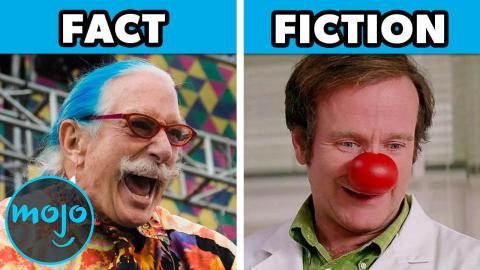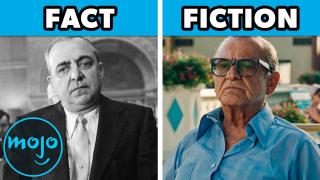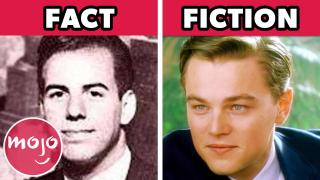Top 10 Biopics That Are Completely Inaccurate

#10: “The Imitation Game” (2014)
Top 10 Movie Biopics That Got It Wrong
This was a widely lauded film that received eight Oscar nominations, including Best Actor for Benedict Cumberbatch. He plays Alan Turing, a notable computer scientist who helped break German codes during World War II. While a great film, it is nevertheless filled with historical inaccuracies. Various events are completely warped for the purposes of drama, like naming the machine “Christopher” after Turing’s childhood friend. Furthermore, the general portrayal of Turing was off. By all accounts, the scientist was personable and sociable, not cold and awkward. Friends also noted that the chemical castration had little effect on his personality or mental capabilities, and the method of his death is still hotly debated, despite the film’s confident epilogue.
#9: “The Doors” (1991)
Top 20 Must See Biopics
This iconic rock band certainly deserves their own movie. But it wasn’t this movie. Val Kilmer shines as Jim Morrison, but “The Doors” is so wildly inaccurate that it earned ire from the very people it represents. Many people - including director Oliver Stone - have admitted that storytelling took precedence over accuracy. Many things are fabricated or exaggerated - most notably Morrison’s violent behavior and his troubles with alcohol. In fact, Morrison’s portrayal is often the primary criticism leveled at the movie. All the surviving Doors members spoke out and defended Morrison, claiming that he was very little or even nothing like the character depicted in Stone’s movie. As drummer John Densmore beautifully puts it, “The Doors” is about “the myth of Jim Morrison,” not the man himself.
#8: “American Sniper” (2014)
The Shocking True Story of American Nightmare
The titular American Sniper is Chris Kyle, a Navy SEAL with over 150 confirmed kills. Following his honorable discharge, Kyle penned his memoir “American Sniper: The Autobiography of the Most Lethal Sniper in U.S. Military History,” which was subsequently adapted by Clint Eastwood. Unfortunately, both the movie and the book are said to be filled with untruths. Kyle’s memoir was criticized for its supposed embellishments, and many of his claims could not be properly substantiated. Eastwood further clouds the already-murky history and adds many dramatic falsehoods, like the opening scene involving Kyle and a child, a fictional terrorist, and the wild exaggeration of Syrian sniper Mustafa.
#7: “Marie Antoinette” (2006)
Top 10 Behind the Scenes Facts About Malcolm & Marie
Director Sofia Coppola would be the first to admit that “Marie Antoinette” plays fast and loose with history. The movie is intentionally stylized, and Coppola did not set out to create an esteemed period drama. Regardless, the movie received criticism for its perceived shallow character work and complete disregard for history. “Marie Antoinette” is filled to the brim with anachronisms, errors in both time and geography, and inaccurate character work, like the child of the childless Louis XVIII. The film also disregards much of the politics of the time, which is a bizarre decision for a story about Marie Antoinette. It’s certainly a stylish movie, but you’ll have to look elsewhere for an academic foray into the queen’s life.
#6: “Alexander” (2004)
Oliver Stone may be a talented director, but his focus is usually placed on story over history. Alexander the Great led a fascinating life that is ready-made for a good movie. But not only is Stone’s “Alexander” inaccurate - it’s not very good and maybe even a little harmful. Historians have argued that “Alexander” is very Orientalist and that it depicts the Persians in a borderline racist light. For example, they did not wear turbans, we don’t know if they had uniforms and they didn’t have Arabic words in their language at the time. Stone was also forced to condense many events and battles for the sake of brevity, resulting in a slew of wonky historical details. Even at three hours, “Alexander” isn’t long enough to accurately depict the life of a near-mythical figure.
#5: “Patch Adams” (1998)
Many people like “Patch Adams,” but critics did not. They took issue with the movie’s manipulative sentimentality and the characterization of the title character. And it wasn’t just critics who hated it - Patch Adams himself was not a fan. While he ultimately admitted to liking the performance of Robin Williams, he nevertheless took enormous issue with the movie’s simplistic depiction of his character and charitable work. It prioritized schmaltzy, feel-good tenderness over realism, making Adams look like little more than a goofy clown who entertains sick children. This was often a problem when Robin Williams played real people, as the “Robin Williams”-ness of it all could overshadow the more complex story hidden underneath.
#4: “Amadeus” (1984)
It’s often the most larger-than-life figures who get the most inaccurate biopics. While a fantastic movie, “Amadeus” is not an accurate representation of the iconic composer. It works as a film, but let’s not show it in history class. The basic premise of the movie is completely made up, as Mozart and Antonio Salieri were not bitter enemies. This rumor only spread after Mozart’s death and later gained traction in Alexander Pushkin’s play “Mozart and Salieri.” The characterization of Salieri as a lonely celibate is also totally fictional. Aside from the character work, the movie is also filled with errors and anachronisms. For example, Mozart was not buried in a mass grave, and he does not conduct the orchestra the way they would have in the 18th century.
#3: “A Beautiful Mind” (2001)
Top 20 Most Historically Inaccurate Movies
Russell Crowe received an Oscar nomination for playing John Nash, a Nobel-winning mathematician who suffered from schizophrenia. “A Beautiful Mind” works as a tender movie and accurately depicts the general theme of Nash’s life and accomplishments. But it is not an accurate portrayal of his day-to-day experiences. His mental illness is exaggerated to a degree, with movie Nash suffering from visual hallucinations and conjuring up imaginary people. The real Nash never experienced this symptom. Furthermore, Nash’s character is blunted to a degree, making him more sympathetic and ironing over his more problematic behavior. Finally, the feel-good ending is completely fictional, as Nash’s acceptance speech was made up for the movie.
#2: “Braveheart” (1995)
A good historian could write a book about the historical inaccuracies of “Braveheart.” When it comes to misportraying history for the sake of telling a story, “Braveheart” reigns supreme. In fact, it’s probably easier to say what the movie got right than going through the exhaustive list of what it got wrong. Writer Randall Wallace has admitted that he took more inspiration from an epic poem than he did history, and that certainly comes through in the film. Fake legal rights, anachronisms, inaccurate portrayals of real people, bad military history - it’s all present and accounted for. Even its depiction of William Wallace is false, glossing over his violent use of conscription and completely re-writing his upbringing. Freedom, indeed. Freedom from any sort of notable realism.
#1: “Catch Me If You Can” (2002)
Top 10 Things Catch Me If You Can Got Factually Right & Wrong
Throughout “Catch Me If You Can,” we watch in endless fascination as Frank Abagnale enacts various cons. But we were the targets of the greatest con of all. The movie is based on Abagnale’s book of the same name, whose veracity was questioned before it was even published. Investigations have shown that Abagnale either greatly exaggerated his exploits or simply made them up. Journalists have discredited numerous aspects of the story, including Abagnale’s work with the FBI and passing the bar exam. In fact, Abagnale was in prison when some of the events of the story supposedly took place. He conned publishers and filmmakers into thinking that his story was true and likely made millions along the way.







